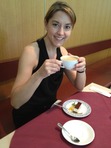Jennifer Tarle's Blog, page 84
June 22, 2017
Nurturing and the brain
People know that nurturing leads to well adjusted adults. Studies have looked at the psychological impact of nurturing. Now, we know that it aids leaning, too.
A study from Washington University School of Medicine in St. Louis shows that mother’s nurturing leads to changes in the brain. Specifically, It leads to growth in the hippocampus which is important to learning, memory, and stress response.
June 20, 2017
How to Pronounce POOR, POUR, POOL – American English Pronunciation Lesson
Learn how to pronounce the English words POOR, POUR, POOL correctly with this American English pronunciation lesson.
Jennifer Tarle from Tarle Speech and Language guides you through a quick pronunciation lesson with quick tips to have you sounding clearer in no time.
POOR and POUR are pronounced P-OR and rhyme with door, core, four, lore, more, nor.
POOL is pronounced P-long OO-L and rhymes with cool, fool, rule.
June 19, 2017
Nap time
Summer is here. That means fun, fun, fun. Just don’t forget to schedule nap time for your toddler. A study by the University of Colorado Boulder shows the importance of a daytime nap.
Children, who missed a day time nap showed less positive emotional responses, were less likely to demonstrate they didn’t understand, and were less likely to ask for help. A sleepy toddler will therefore be less socially engaged, less likely to cope with frustration leading to tantrums, and were less positive.
Take a siesta. You and your child will be ready for more fun!
June 15, 2017
What is a heteronym?
Heteronyms are confusing. These words are spelled the same but are pronounced differently. Depending on the pronuncitation, they have different meanings. That is why it is so important to LISTEN to the pronunciation instead of relying on reading.
Here are some examples:
Close:
Pronounced CLOZ means to shut.
Pronounced CLOS means near.
Bass:
Pronounced BASE means an instrument.
Pronounced BAS means the fish.
June 14, 2017
How to say ALL
Take this quick ESL pronunciation speaking lesson to learn how to pronounce the word: ALL. It is pronounced Short o-L. Yes, only two sounds for three letters.
Need more help, then buy a sound package with directions on how to say the sound, audio examples, video examples, and practice word and sentence lists.
short o: http://www.tarlespeech.com/product/sh...
L: http://www.tarlespeech.com/product/th...
SUBSCRIBE: http://www.youtube.com/user/TarleSpeech
BLOG/SHOP: http://www.tarlespeech.com
FB: http://tinyurl.com/create.php
TWEET: https://twitter.com/tarlespeech
GOOGLE+: http://tinyurl.com/ol5x762
PODCAST: http://tinyurl.com/q82ph7c
IBOOKS: http://tinyurl.com/nfwe2sf
June 13, 2017
How to Pronounce ALL – American English Pronunciation Lesson
Take this quick ESL pronunciation speaking lesson to learn how to pronounce the word: ALL. It is pronounced Short o-L. Yes, only two sounds for three letters.
Join Jennifer Tarle from Tarle Speech and Language for his Minute of Speech video lesson. Be clearer in your communication in minutes!
ALL is pronounced short O, L. It rhymes with ball, call, tall, doll, mall, wall.
Need more help, then buy a sound package with directions on how to say the sound, audio examples, video examples, and practice word and sentence lists.
short o: http://www.tarlespeech.com/product/sh...
June 12, 2017
Help your child talk: Expand for your child
Trying to help your child expand from one word utterances, then add a word. Sounds simple because it is. Adding a word will provide your child with a model for how to combine words. Your little one doesn’t have to repeat after you. Listening is his only task. But in time, you will hear longer phrases.
Here are a few examples:
Child says “up” You say “pick up”
Child says “all gone” You say “crackers all gone”
Child says “shoe” You say “shoe off”
June 10, 2017
Hello, Animals! by Smriti Prasadam
Hello, reader!
This board book has great black and white illustrations with shinny splashes. The words are simple, repetitive lines: “Hello, animal!”. Each page also lists sounds related to the animal.
This book is great for young children since they can say “hi” to all of the animals. Kids also love naming the animals and imitating their sounds. This will be a favorite!
June 9, 2017
Homographs: different meaning and different pronunciation
Homographs are words that have the same spelling, but the meaning and pronunciations are different. These are VERY difficult for most ESL speakers.
For example:
CLOSE
Close (pronounced CLOZ) the door.
Don’t stand so close (pronounced CLOS) to me.
PROJECT
The project (pronounced praw ject) is difficult.
Please project (pronounced pro ject) your voice.
How to pronounce EARLY
The word “EARLY” is frequently mispronounced by foreign speakers. I often hear people say “ear” ly. This is incorrect and sounds like a reference to the body part used to hear.
To correct this mistake, say “ER”, like the sound at the end of occupations: teacher, professor, driver, and programmer, not “EAR”.



